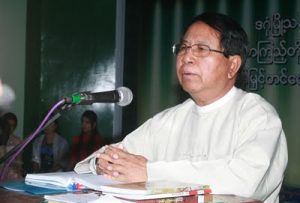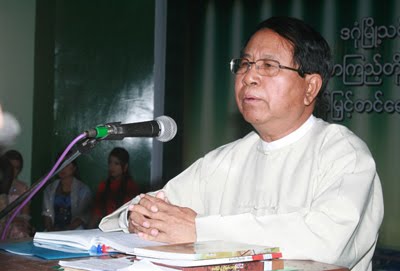Independent Mon News Agency – In a press conference held by Union Information Minister U Kyaw San on 12 August, the minister manipulated and fabricated some ceasefire agreement points related to the 2008 Constitution and 2010 elections, said Nai Hong Sar, General Secretary of New Mon State Party (NMSP).

Nai Hong Sar said, “Among eight points U Kyaw San outlined to reporters related to ceasefire agreements during the 1990s, I don’t want to comment on anything about points one to six, but for points seven and eight, he totally manipulated and lied to the journalists, because I have never heard about these points in any ceasefire agreement with different armed groups”.
During the press conference, U Kyaw San detailed eight points supposedly part of all ceasefire agreements with armed groups. He described point seven as being ‘The ethnic ceasefire groups will follow according to the new constitution for political transition’, and point eight as ‘…abandoning armed struggle and entering into the elections according to the constitution’.
Nai Hong Sar said these points were totally fabricated, as during the ceasefire talks with ethnic groups in the period of 1990–1996, there were no signs or mention of the drafting of a new constitution or holding elections.
He said he did not want to comment on points one to six as outlined by the minister because they were more or less the same as those agreed to with different ethnic groups while entering into ceasefire agreements. They are: (1) not to increase number of troops; (2) discontinue all illegal activities including extortion; (3) carry out all activities only within a fixed area; (4) freedom to travel in designated areas, but travel to other places only with official permission; (5) not to make any contacts with organizations or political parties opposing the government, and (6) not to make any interference in the administration, management, and judicial affairs of the government.
U Kyaw San accused the ceasefire groups of never keeping their promises and not following the new constitution.
But Nai Hong Sar pointed out that the SPDC broke many ceasefire points by attacking small ceasefire groups and forcing them to surrender.
He said, “After NMSP, the regime did not really follow the ceasefire agreements. They forced drug kingpin U Khun Sa’s Mong Tai Army (MTA) and the Burma Communist Party (Arakan) to surrender. Later on, they pressured two ceasefire groups of Palaung and Shan ethnic nationalities to surrender totally. I would like to ask in return whether the regime has kept its promises, as they said.”
Nai Hong Sar also pointed out that nearly all ceasefire agreements between the former military regime, SLORC/SPDC, and different ceasefire groups were arranged by the former intelligence chief, Lt. Gen. Khin Nyunt and his group. U Kyaw San (or Brigadier Kyaw San) was never involved in any ceasefire talks or agreements.
Following the ceasefires, whenever there was a political crisis, NMSP and other ceasefire groups always called for ‘political dialogue’, but the SPDC leaders continually claimed they were a military caretaker government, and they had no rights for political dialogue. The SPDC leaders told the ceasefire groups they would have to talk to the ‘future civilian government’ for political settlement.
Until 2008, there was no political dialogue, but NMSP and other ceasefire groups joined the National Convention from 2004 to 2008. However, SPDC continually rejected all points proposed by ceasefire groups. Finally, the ceasefire groups announced that they did not agree with the 2008 Constitution, and boycotted the 2010 elections.
During 2009 and 2010, while the former regime was pressuring the ceasefire groups to transform themselves into ‘Border Guard Forces’, the major ethnic ceasefire groups, including the Kachin, Wa, Shan, Karen, and Mon, declined, and a new fighting broke out along the China-Burma and Thailand-Burma borders.

